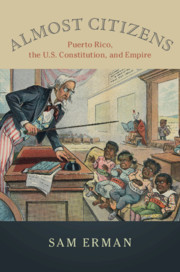Book contents
- Almost Citizens
- Series page
- Almost Citizens
- Copyright page
- Dedication
- Contents
- Figures
- Acknowledgments
- Abbreviations
- Introduction
- 1 1898: “The Constitutional Lion in the Path”
- 2 The Constitution and the New U.S. Expansion: Debating the Status of the Islands
- 3 “We Are Naturally Americans”: Federico Degetau and Santiago Iglesias Pursue Citizenship
- 4 “American Aliens”: Isabel Gonzalez, Domingo Collazo, Federico Degetau, and the Supreme Court, 1902–1905
- 5 Reconstructing Puerto Rico, 1904–1909
- 6 The Jones Act and the Long Path to Collective Naturalization
- Conclusion
- Afterword
- Notes
- Index
Conclusion
Published online by Cambridge University Press: 23 November 2018
- Almost Citizens
- Series page
- Almost Citizens
- Copyright page
- Dedication
- Contents
- Figures
- Acknowledgments
- Abbreviations
- Introduction
- 1 1898: “The Constitutional Lion in the Path”
- 2 The Constitution and the New U.S. Expansion: Debating the Status of the Islands
- 3 “We Are Naturally Americans”: Federico Degetau and Santiago Iglesias Pursue Citizenship
- 4 “American Aliens”: Isabel Gonzalez, Domingo Collazo, Federico Degetau, and the Supreme Court, 1902–1905
- 5 Reconstructing Puerto Rico, 1904–1909
- 6 The Jones Act and the Long Path to Collective Naturalization
- Conclusion
- Afterword
- Notes
- Index
Summary
- Type
- Chapter
- Information
- Almost CitizensPuerto Rico, the U.S. Constitution, and Empire, pp. 144 - 159Publisher: Cambridge University PressPrint publication year: 2018



